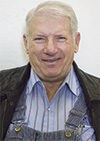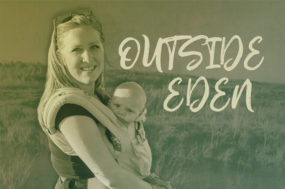The sergeant’s truck turned off the road, and Al pulled his truck over and stopped. The officer riding with him asked why he had stopped and why he was not following the other truck.
Al told the officer that the sergeant always made the wrong turn here, and he always stopped and waited for him to turn around and come back. By and by the other truck came back, and Al resumed following it to their destination.
Al survived the war with minor damage. His feet had been frostbitten, and troubled him somewhat the rest of his life. I met Al Boerjan the first time I came to his home looking for his second daughter.
I found out later that he had said to her, “Norchie” (his pet nickname for her), “you hang on to this one,” referring to me. She minded her daddy.
I was in Minneapolis, Minnesota for the summer, working construction. In the fall I would return to Brigham Young University in Provo, Utah. I ended up spending two summers in Minneapolis, the summer I met Elli and the following summer.
I remember Al telling his family to watch out for me when the storm clouds looked like a tornado was possible, since I would not be aware of when it was time to head for the cellar.
Al was an ace mechanic. One day he handed me a lawn sprinkler, that when new moved by itself as it sprinkled the lawn. It still squirted water but would not move.
Al asked me to take it apart so we could fix it. After trying to get it to come apart for a while, Al asked what the problem was. I told him I was afraid I would break it if I put more pressure on it trying to get the two halves separated.
“It’s already broken,” Al said. “Get it apart and at least we can see how it works.” With that, I broke it apart. The insides of it were worn beyond repair. But we understood how it worked.
Two neighborhood boys had adopted Al. The rule was that they could come in his garage when he was in the garage or by permission when he was home. They once went into the garage when Al was gone. It was several months before they could even come in the yard, whether Al was home or not. They respected Al’s rules after that episode.
I showed up unannounced one Saturday, and Jeff and Randy got to my car before I had it turned off. They knew why I was there. They told me that the object of my trip was down the street babysitting.
I handed them the bouquet of flowers I brought for Elli and directed them in how to present them. Then they were to find out how long before she would be free.
They ran to the house and entered, probably without knocking, found Elli sitting on the sofa, dropped to their knees, extended the flowers and one of them said, “Oh fair maiden, yonder knight awaits you outside and has sent to you this token of flowers.” They came back without the flowers, and they and I found Al and entertained ourselves for the hour or so until the correct set of parents got home and freed Elli from the kids.
Al worked for NAPCO in Minneapolis. To avoid rush hour traffic, the guys he worked with petitioned the boss to let them start work two hours earlier than the normal starting time and also be done two hours earlier.
It worked. Al told me of the time that the engineers thought they had the welding process figured out so they could weld the ends on the axle housings for rough terrain fork-lifts without beveling the joint.
Six months later they were in the process of removing the internals from the axles and installing them in housings that had been “properly” welded, as done before the engineers had their faulty brainstorm.
The machines the axles were used on were four-wheel drive and four-wheel steer. It was taking a four-man team two days to take apart and reassemble each axle.
Al asked his foreman for two days with one of his buddies, undisturbed, and one of the defective axles to see if they could find a faster way to make the change.
At the end of the two days they had figured out how to hold the steering hub assembly together while they slid it out of the defective housing and into a new housing. Two men could change over an axle in two hours, instead of four men and two days. Al was a hero.
One raining Saturday afternoon Al and I were in the basement of his house, doing I can’t remember what. Upstairs Mrs. Boerjan and one of her other daughters were having a bit of a disagreement.
It escalated until Al was summoned upstairs to “Do something with YOUR daughter!” Al rolled his eyes and shook his head, and said to me as he headed upstairs, “I was afraid I was going to end up in the middle of that.”
Al overhauled cars in his garage evenings and weekends. He grew a huge garden with flowers and bushes in addition to the vegetables.
Elli told me that one year the environmentalists had banned an insecticide that her Daddy used to keep the bugs off of the tomato plants. For one summer there was nothing available to replace it. She said that summer all it seemed she and her sisters did was stand in the tomato patch and “squash bugs.”
I interrupted a card game to get Al out where I could talk to him in private the night I asked permission to marry his daughter. He told me that if the daughter was happy with it he was tickled silly.
He asked if I had said anything to his wife about it. I told him no, that where I came from the girl’s father was the one who gave permission for her to marry. He just smiled.
Elli and I left for the evening. About two hands later in the card game Elli’s mother got out of Al what I needed to talk to him about in private. About that time the neighbors thought it was time to fold up the cards and go home for the night.
Al had been a heavy smoker. Emphysema and lung cancer took him long before I was done getting to know him and pick his brain for the world of mechanical knowledge he had. Damn those Camels. I still miss him. FG










